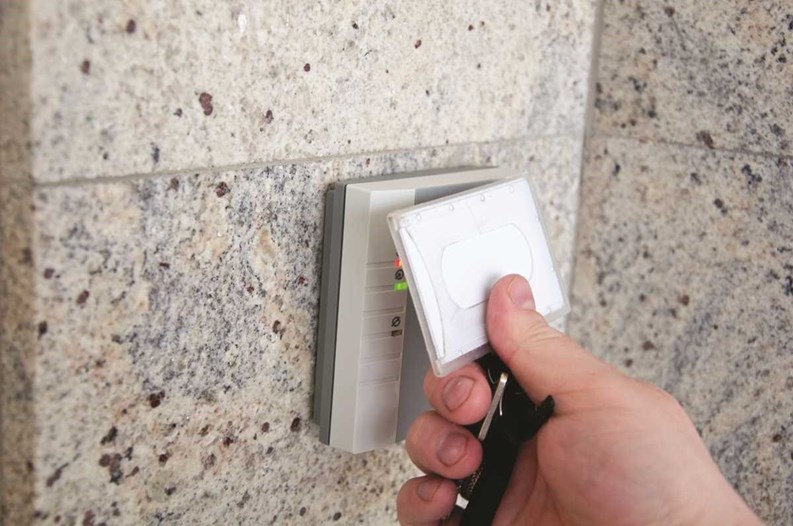While crime rates are steadily decreasing nationwide—even in the tri-state area—multifamily dwellings are often more difficult to 'police' due to the number of residents, visitors, delivery personnel and third party workers such as contractors constantly coming and going at all hours. As a result, determining how and when people are accessing your condo or co-op building becomes a top priority for board members and management companies.
“Under the application of the Business Judgment Rule (generally known as the BCL), the courts generally defer to the decisions of the boards of co-ops and condominiums to decide among other things, the operation of the property,” says Dennis H. Greenstein, an attorney and partner at the New York-based law firm of Seyfarth Shaw. “Boards have authority to enact rules and regulations (in condos) and house rules (in co-ops). Unless the courts find that the board or board members were discriminating or acting in bad faith, they defer to the provisions of the governing documents of the condos and co-ops, which grant the board’s authority to decide issues like access of unit owners, guests, workmen and others.”
With direction from the BCL, board members have a touchstone as to how to handle protocol in their own community, but frequently the municipality will weigh in as well. For example, “The city or town may dictate that every apartment house a certain number of families and above must have a voice intercom with front door release to every unit,” says Matthew Arnold, president of the College Point, New York-based Academy Mailbox Co., Inc. “Many co-ops require that the front door stays locked—no door release—at all times, and that every resident has to physically leave their unit to let a visitor or delivery person in.”
Arnold also points to a recently adopted law in Boston that requires every building with 10 or more units to require a video intercom. While it is yet to be a common requirement, he says the initiative is “very progressive.”
Who Should Get In?
With many buildings housing upwards of 50 units or more in parts of New Jersey, ensuring the validity of “approved” visitors can become a gray issue, especially if the party in question is a non-frequent visitor.
“There are strict regulations...to work in co-op or condo buildings,” says Mark Lerner, Ph.D, president of the New York City-based EPIC Security Corp., who have clients in both New York and New Jersey. “Any employee needs to have a security registration, which includes a background check that looks into criminal records.”
While state regulations are in place to guide boards and managers on building “access” issues, if a problem arises, often the building is held responsible. “It is important that these workers have liability insurance and worker’s compensation insurance. For example, our employees are bonded up to $1 million, which covers any type of incident that might occur,” says Lerner. “A plumber or an electrician must carry their own insurance. If the building hires workers, they are ultimately responsible.”
Lerner notes that liability cases are often long and drawn out undertakings. Greenstein agrees, and suggests a proactive approach. “Boards should consult with their insurance brokers to see what their insurance covers as it relates to liability for personal injury, property damage and theft. The managing agent can bring a wealth of experience in guiding boards regarding health club facilities and child care facilities.”
When it comes to hiring contractors, Greenstein says boards must exercise due diligence. “Contractors performing work should be licensed and have insurance in amounts, types and coverage acceptable to the building, which would include personal injury, property damage, theft and other coverage,” he continues. “Of course, buildings should have alteration policies in place and depending on the type and scope of work, the shareholder may be required to sign an alteration agreement in addition to having the contractor, plumber or electrician produce insurance to the managing agent.”
Approved contractors and property managers often enter the common areas of the property without issue; however, gaining access to residential units can present challenges. “We have been serving this market for over 30 years, and the only issues we’ve ever faced is entering and doing work within the tenant/owner’s apartments,” says Larry Dolin, president of the Long Island City-based American Security Systems. “Most often the super or someone else from building management has to let us in and at times stay with our men. Wherever our work has directed us, we have never been denied access, and as far as I know, there are no differences between condos and co-ops when it comes to that.”
Other variables for visitors exist that create board and management confusion, explains Arnold, which can be a costly endeavor. “You need insurance to cover every possible scenario, but there are a lot of gray areas. For example, if apartment 3A lets in a child or delivery person who vandalizes an elevator, who is responsible, the building company, or the insurance company?”
What is Off Limits?
To alleviate the need to decipher the aforementioned question offered by Arnold, boards and managers have to jointly agree on policies such as who is permitted in the building and what areas in the building are considered “off limits.” For many properties, arriving at the correct answer is a process of trial and error.
“Roofs, boiler rooms, telecom closets, IT closets, compactor rooms, building storage rooms (other than tenants), elevator control rooms, super’s offices, management offices—off hours should all be off limits,” says Dolin. Arnold adds, “A good rule of thumb for all buildings is: if it’s off limits, lock it.”
Aside from these areas, questions often arise regarding tenant spaces. “There are areas in condo and co-op buildings which are for the exclusive use of unit owners. These include terraces, balconies, patios and roof areas,” says Greenstein. “In any event, the building by its governing documents will have access for repairs and maintenance of the building and to correct a problem which a unit owner failed to address, thereby compelling the building to do so and then charge back the unit owner.”
In some cases, tenants can be difficult to deal with when security-related upgrades become necessary. Dolin explains that he has experienced tenant roadblocks when it comes to fixing or upgrading intercoms.
“Often tenants do construction in their apartments, and take out an entire intercom line, or short out the entire system. It’s also strange when we are replacing an old intercom system in a building, guaranteed, there some apartments that won’t allow entry,” says Dolin. “They then are not included in the system.”
Eye in the Sky
In many cases, boards simply can’t afford to staff security guards and door-persons 24/7 or at all. As a result, more boards and managers are turning to remote doorman systems or surveillance cameras, which provide an eye in the sky. “It is often a function of the budget of the buildings. All buildings want more security guards in front of the building, in back of the building and in parking areas, but it comes down to what they can afford,” says Lerner.
What is sometimes referred to as an “Internet or video doorman” has received mixed reviews throughout the industry. Arnold explains that an audio and video feed is sent from a building’s front door to an alarm company’s central location, which might be out of state. The central station’s monitoring employee then becomes responsible for letting in the person, whether it's a city or state inspector, a Federal Express delivery person or a resident’s visiting auntie. While it can be an effective mode of security, there are loopholes.
“There are many buildings, which do not have doormen and use video cameras. The key is to be certain that they are operating properly and being monitored,” says Greenstein. “Having them and failing to have them work properly and monitored can create liability for the building.”
Dolin explains that his company’s video monitoring system takes the process steps further to ensure security during the visit. “We are very concerned about liability for the building. Before accepting a package, we check if the tenant has enrolled and wants us to provide this service. We remotely let [the delivery person] in, but follow them with a series of cameras and speaker microphones. We escort him through the building and open the package room,” says Dolin. “We watch them deliver, then escort them out. If they don’t leave, we warn them we will dispatch the police, and we will.”
While it’s imperative to closely watch outside visitors, boards also have to watch for “inside jobs” as crimes have occurred by employees or those who have access to common areas and residential units. Lerner said that closed circuit cameras can be a great help when investigating alleged crimes by intruders or employees. However, he believes the best defense is human eyes and ears.
“In my experience, criminals are not deterred by closed circuit cameras, and research supports this,” he says. “You only have to watch someone robbing a convenience store or banks, they know they are on camera but still commit the crime. An actual doorman is a big deterrent. I would say 95 percent of criminals would not enter a building if they were met by a doorman.”
As is often the case with boards, Arnold said it comes down to education. “I have been a co-op owner and board member since 1996, and I can tell you that only two rules really matter: notification and education. Telling everyone what has changed or what is new, and then explaining why a new rule is changed or added.”
When it comes to property managers, Greenstein offers similar advice. “The managing agent should send out an informational memo explaining the obligations of the unit owners under their proprietary leases and house rules (co-ops) and the bylaws and rules and regulations (condominiums),” he continues. “Giving specific examples of the provisions of such documents is helpful. It is also important to spell out that failing to comply with the requirements may result in actions being taken by the board, which could include legal action, fines and legal fees.”
W.B. King is a freelance writer and a frequent contributor to The New Jersey Cooperator.







Leave a Comment